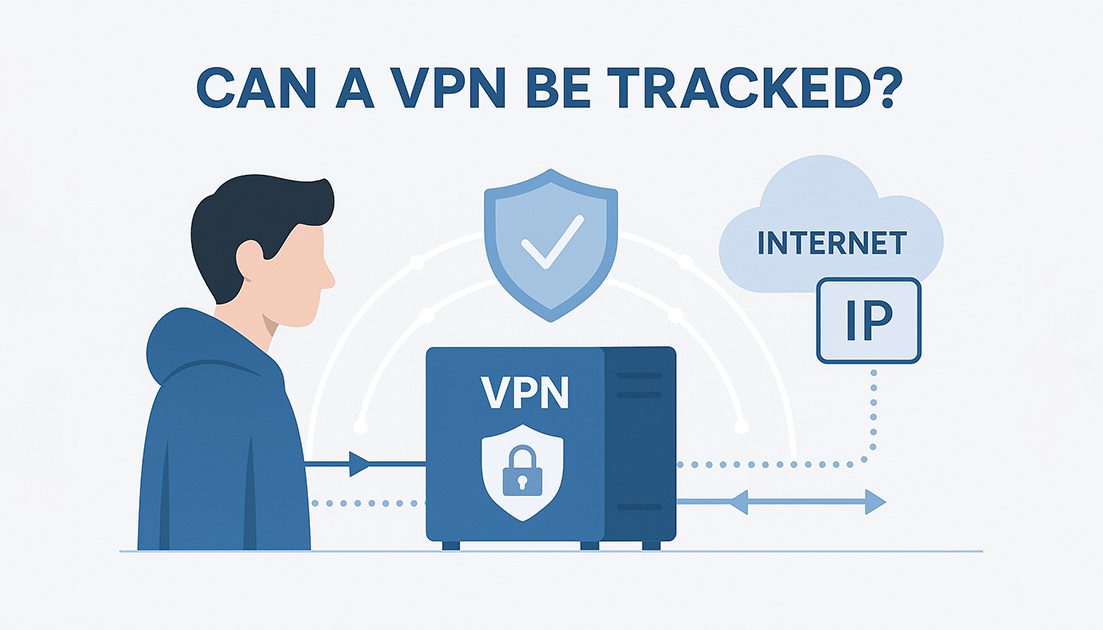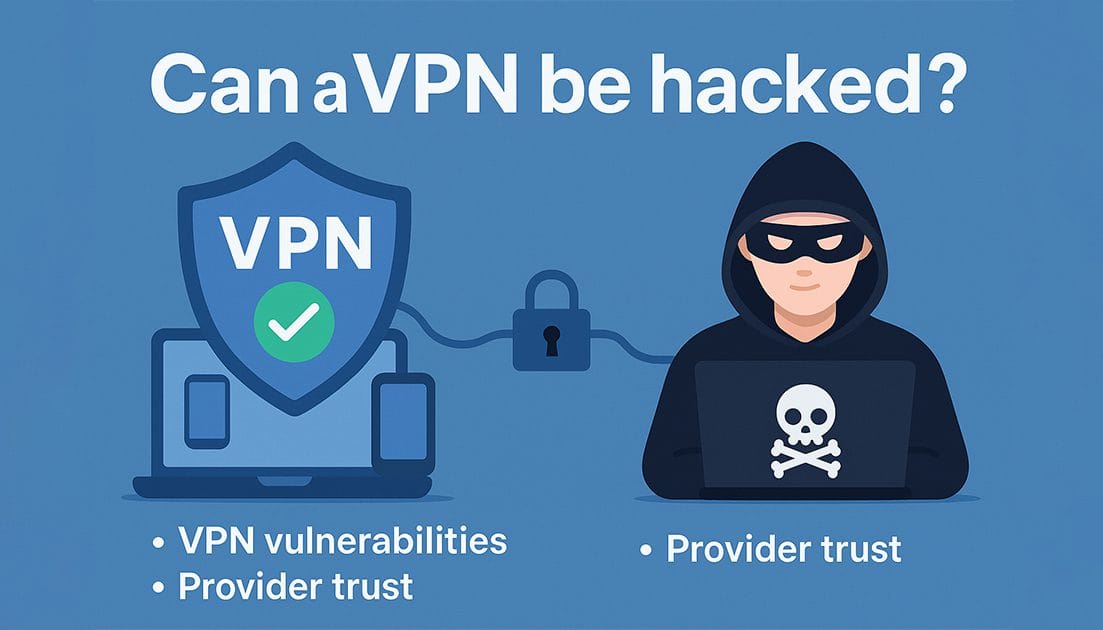If your VPN feels more like a speed bump than a boost, you’re not alone. Many users install a VPN expecting privacy, access, and performance, only to face slower connections and endless buffering. The good news? You don’t have to settle for lag.
In this guide, you’ll learn exactly how to make your VPN faster, with 15 proven techniques that work across all devices and VPN providers. Whether you’re streaming, gaming, or just trying to browse smoothly, these tips will help you reclaim your speed without compromising security.
But first, here’s a quick checklist of easy wins.
- 🔄 Switch to a different VPN server (closer = faster)
- ⚡ Change protocol to WireGuard or IKEv2
- 🔌 Use a wired Ethernet connection instead of Wi-Fi
- 📴 Disconnect unused apps or background tasks
- 🔧 Restart your router and VPN app
- 🧪 Test your speed with and without the VPN
Why Is My VPN Slow?
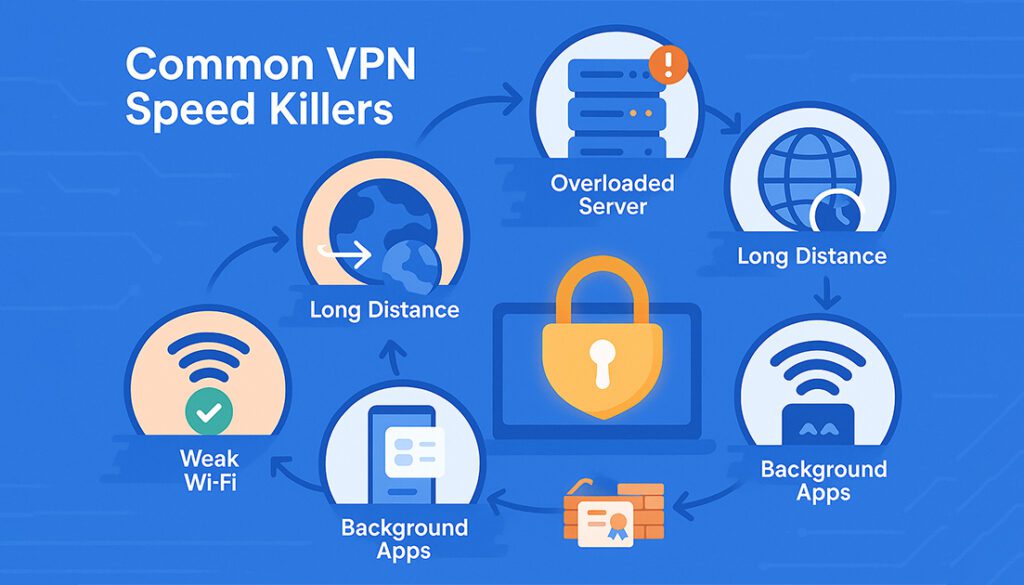
Before you fix your VPN speed, it helps to understand what’s slowing it down. A “Virtual Private Network” works by encrypting your data and routing it through secure servers great for privacy, but that extra step can introduce delays.
Here are the most common reasons your VPN might be running slowly:
🧍 Crowded Server
Too many users on one VPN server leads to slow speeds. Try switching to a less busy server nearby.
🌍 Long Distance to Server
The farther your server is, the longer your data takes to travel. Always connect to the closest region.
🔐 Slow Protocol
Older protocols like OpenVPN (TCP) can be sluggish. Switch to faster options like WireGuard or IKEv2 for better speed.
📉 ISP Throttling
Some internet providers intentionally slow down VPNs traffic, especially for streaming or P2P users.
📶 Wi-Fi Interference
Weak signals or multiple devices on the same Wi-Fi network can reduce overall speed, even with a fast VPN.
📱 Background Apps
Apps running in the background may be using bandwidth without you realizing it. Shut them down to free up resources.
Understanding the problem is step one. Now, let’s speed things up with the most effective solutions
15 Proven Methods to Speed Up Your VPN
We’ve organized these into practical, easy-to-follow tips, covering everything from server tweaks to app settings.
1. 🌍 Switch VPN Server
Pick a geographically closer or less crowded server to reduce latency and increase speed.
2. ⚡ Use a Faster Protocol
WireGuard or IKEv2 usually offer faster speeds than older protocols like OpenVPN.
3. ✂️ Use Split Tunneling
Route only selected traffic through the VPN, letting other apps use your regular connection.
4. 🔄 Restart Your Router
Rebooting clears temporary network issues and DNS hiccups that may affect VPN speed.
5. 🧹 Close Bandwidth-Heavy Apps
Shut down cloud backups, torrents, or large downloads running in the background.
6. 📱 Try a Different Device
Performance varies. Some devices may handle VPN encryption better than others.
7. 🔌 Use Wired Ethernet
Ethernet offers a more stable and often faster connection compared to Wi-Fi.
8. 🧱 Disable Firewalls Temporarily
Firewalls may interfere with VPN tunneling. Disable briefly to test performance.
9. 🧼 Clear Cache & Browser Data
Old cache can interfere with DNS routing and cause slowdowns.
10. 🌐 Change DNS Settings
Use faster DNS providers like Cloudflare (1.1.1.1) or Google (8.8.8.8) for quicker lookups.
11. ⬆️ Update Your VPN App
Outdated clients can have performance issues. Keep your VPN software up to date.
12. 🧩 Try a Different VPN App
Third-party VPN apps or manual configs might offer better speed than the default app.
13. 🔀 Switch to Another VPN Provider
If nothing else works, your provider may be the bottleneck. Test a faster alternative.
14. 📡 Use a VPN-Compatible Router
Let your router handle encryption to offload work from your device and maintain better speeds.
15. 📊 Test Without the VPN
Run a speed test with and without the VPN to identify whether the VPN is the actual cause.
These steps cover every angle, from quick app tweaks to deeper network-level optimizations.
Choosing the Right VPN Protocol
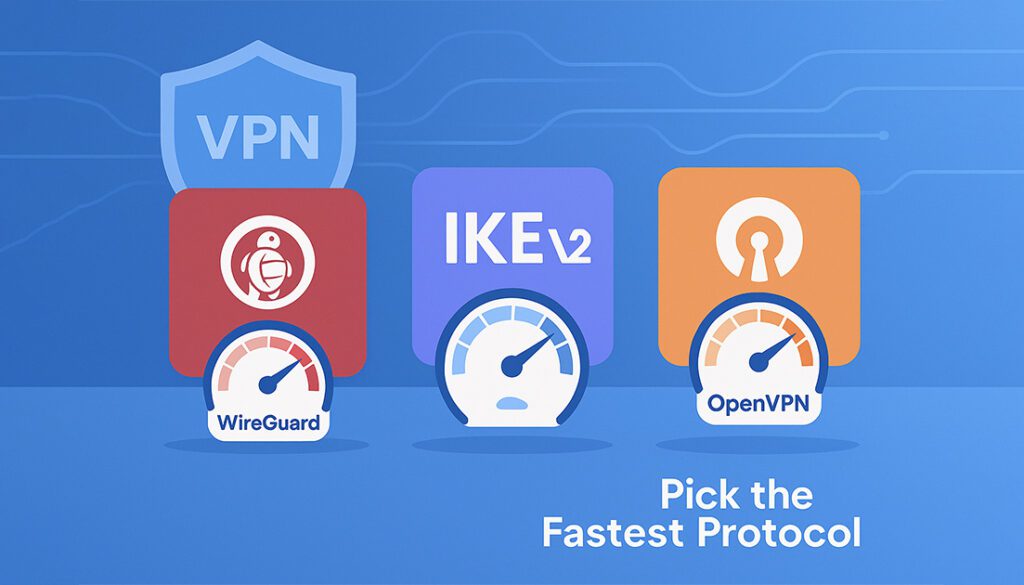
Not all VPN protocols are created equal. Some prioritize security, while others are optimized for speed. If you’re experiencing slow connections, simply switching protocols can make a huge difference, especially if your provider supports newer options.
Here’s a quick comparison of the most common protocols:
| Protocol | Speed | Security | Best For |
|---|---|---|---|
| WireGuard | ⚡ Fastest | ✅ Very Secure | Everyday use, streaming, gaming |
| IKEv2/IPSec | ⚡ Fast | ✅ Secure | Mobile users, switching networks |
| OpenVPN (UDP) | ⚠️ Moderate | ✅ Very Secure | General use, stable performance |
| OpenVPN (TCP) | 🐢 Slow | ✅ Very Secure | Bypassing censorship/firewalls |
| SSTP, PPTP | ⚠️ Variable | ❌ Outdated | Not recommended |
📌 Pro tip: If your VPN supports WireGuard, start there. It’s lightweight, fast, and encrypted by default.
Server Location Matters
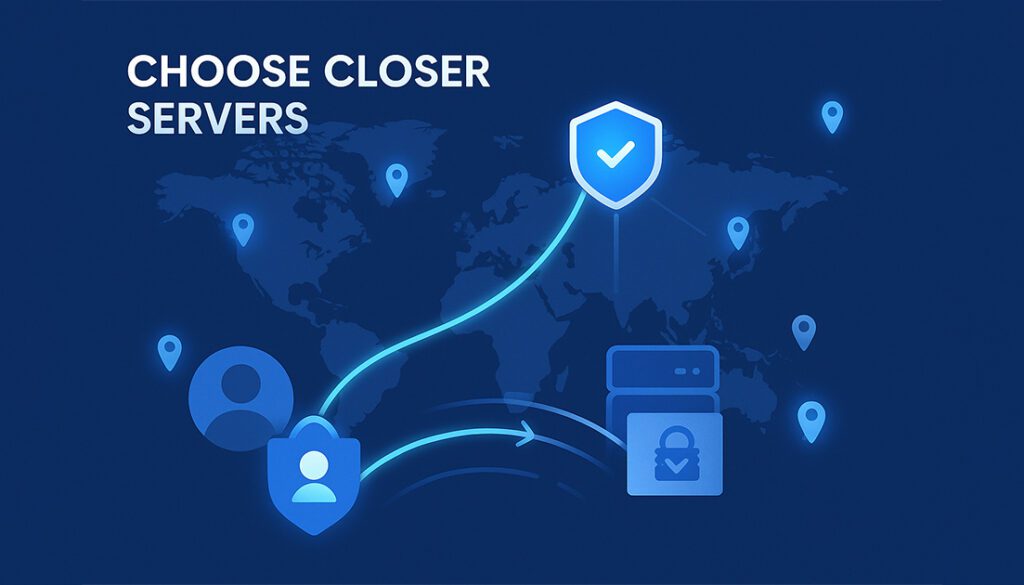
Where your VPN server is located has a major impact on your connection speed. The farther your data has to travel, the more likely you are to experience lag, buffering, or dropped connections.
Choosing a server close to your physical location is one of the simplest and most effective ways to make your VPN faster.
📍 Best Practices for Choosing Server Locations
- Closest isn’t always best: Test 2–3 nearby countries to find the fastest one.
- Avoid overloaded servers: Even nearby servers can be slow if overused.
- Skip ultra-remote servers: Only use distant servers for geo-unblocking.
- Check for speed-labeled servers: Some VPNs highlight fast or optimized options.
🔎 Example:
If you’re in Germany, a nearby server in the Netherlands will likely perform better than one in the US or Australia, unless you’re specifically trying to access content there.
Device and Network Optimization
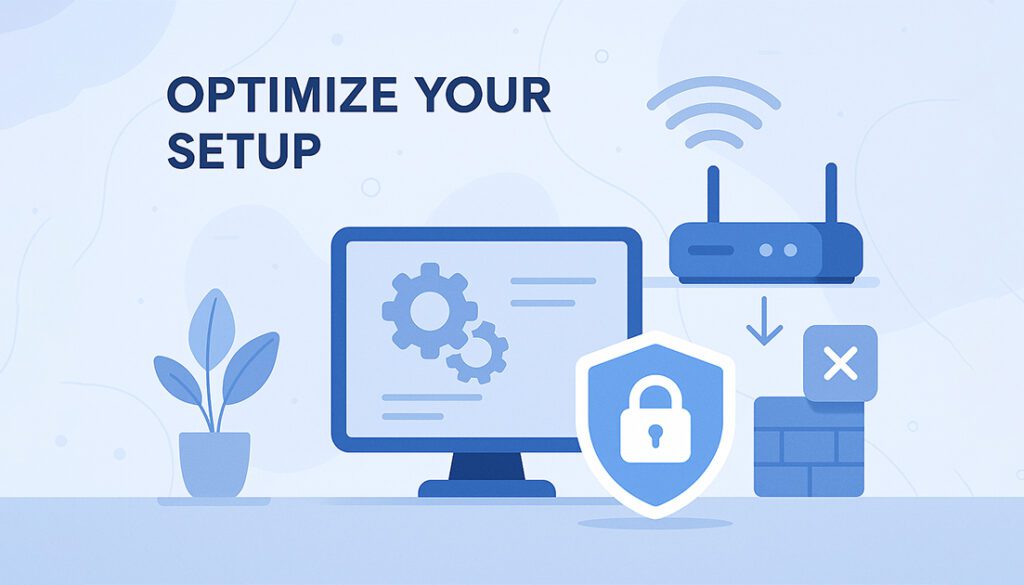
Your VPN speed isn’t just about the server or protocol. Sometimes, your own device or home network setup is the bottleneck. A few small adjustments can make a big difference.
🧹 Close Background Apps
Apps like Google Drive, Dropbox, or Steam can quietly consume bandwidth. Pause or close them while using your VPN.
📶 Upgrade Router Placement
Keep your router in an open, elevated space, away from walls or electronics that block signal strength.
🧪 Run a Speed Test Without VPN
Check your baseline internet speed. If it’s slow without a VPN, the issue might be your ISP or hardware, not the VPN itself.
🎛️ Use QoS (Quality of Service)
Some routers allow you to prioritize VPNs traffic. Enable QoS settings to allocate more bandwidth to your VPN client.
🔒 Disable Conflicting Extensions
Browser add-ons (like ad blockers or HTTPS enforcers) can slow VPN activity. Disable them temporarily to test performance.
✅ A small tweak in your network setup might unlock faster, smoother VPN performance without upgrading your plan.
VPN Speed Testing Tools
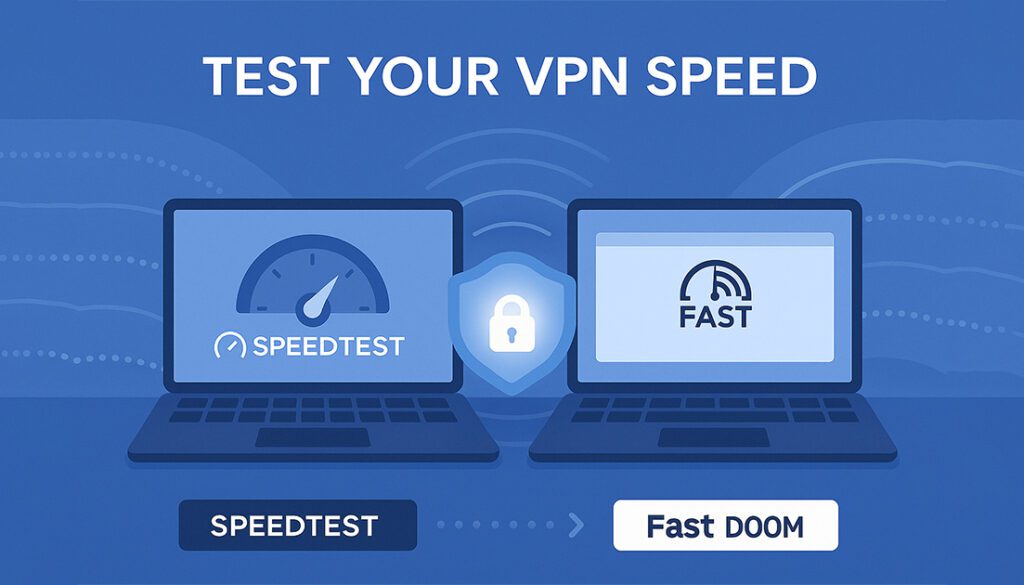
To know if your changes are working, you need to measure your VPN speed accurately. That means testing your connection both with and without it enabled.
Here are the best tools and tips for doing it right:
Speedtest by Ookla
Fast, accurate, and widely trusted. Great for checking ping, download, and upload speeds.
Fast.com
Simple, ad-free, and run by Netflix. Useful if you stream a lot and want quick results.
Cloudflare Speed Test
Detailed latency and jitter analysis. Best for checking overall routing efficiency.
🧠 Testing Tips:
- Run 2–3 tests with and without your VPN
- Test multiple servers and protocols
- Use Ethernet for most accurate results
- Clear cache or restart the browser between tests
Streaming, Gaming, and P2P Tips
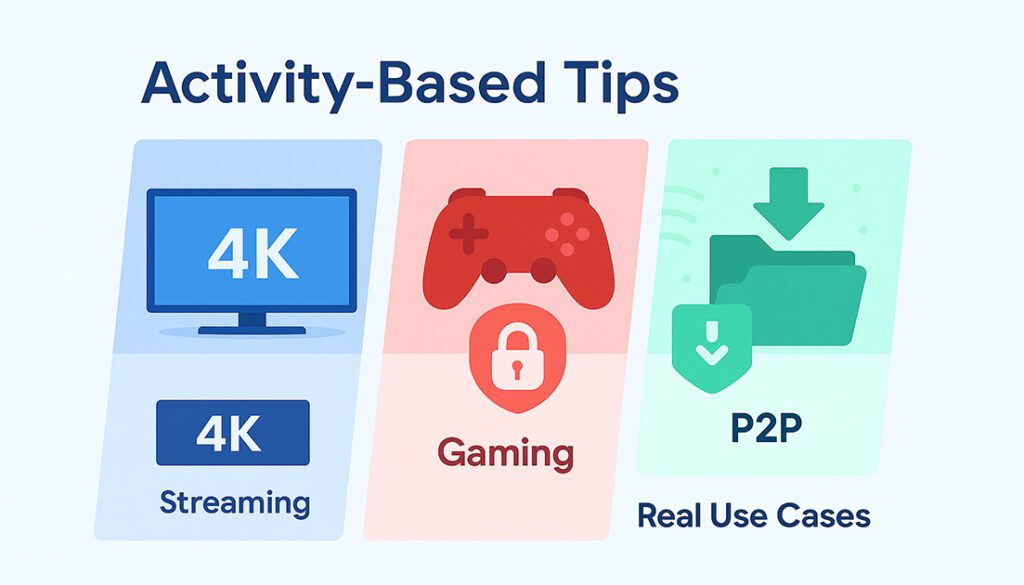
Not all VPN usage is the same. Whether you’re trying to stream Netflix, reduce ping in online games, or share large files via torrenting, you’ll need to tweak your VPN differently for best results.
Below are optimization tips based on your activity:
📺 Streaming (Netflix, Hulu, etc.)
- Use WireGuard or IKEv2 for faster connections
- Choose streaming-optimized servers (many VPNs label them)
- Connect to the country where the content is available
🎮 Gaming (Online, Low Ping)
- Connect to servers geographically close to the game server
- Use lightweight VPNs clients and protocols like WireGuard
- Disable background tasks to free up bandwidth
📂 Torrenting & P2P
- Use a P2P-friendly VPNs provider
- Choose servers optimized for torrenting
- Enable kill switch and DNS leak protection
Each use case has different demands. Customize your setup to match your goal, and your VPN won’t just be private, it’ll be fast too.
Top VPNs for Speed (Tested & Verified)
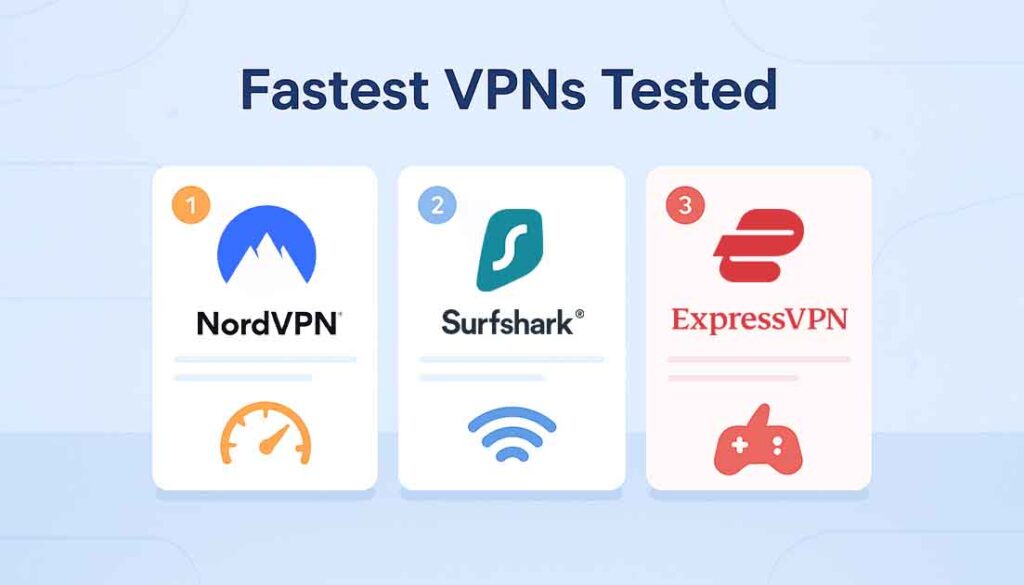
Not all VPNs slow you down. Some are built for speed, using next-gen protocols, high-capacity servers, and smart routing technology. If you’ve tried everything and still experience lag, switching to a high-performance VPN might be the fastest fix.
Below are three top-rated VPNs tested for real-world performance in streaming, gaming, and torrenting:

NordVPN
- Avg. Speed: 820 Mbps (WireGuard)
- Streaming: 4K Netflix, no buffering
- Gaming: Low 30ms ping across regions
- P2P: Dedicated torrent servers

Surfshark
- Avg. Speed: 760 Mbps (WireGuard)
- Streaming: Unblocks 15+ platforms
- Gaming: Reliable with low jitter
- P2P: Allowed on all servers

ExpressVPN
- Avg. Speed: 720 Mbps (Lightway)
- Streaming: Excellent for 4K & live TV
- Gaming: Very stable across devices
- P2P: No speed caps, secure tunnels
💡 Want more options?
Check out our full guides:
When to Upgrade or Switch Your VPN Provider
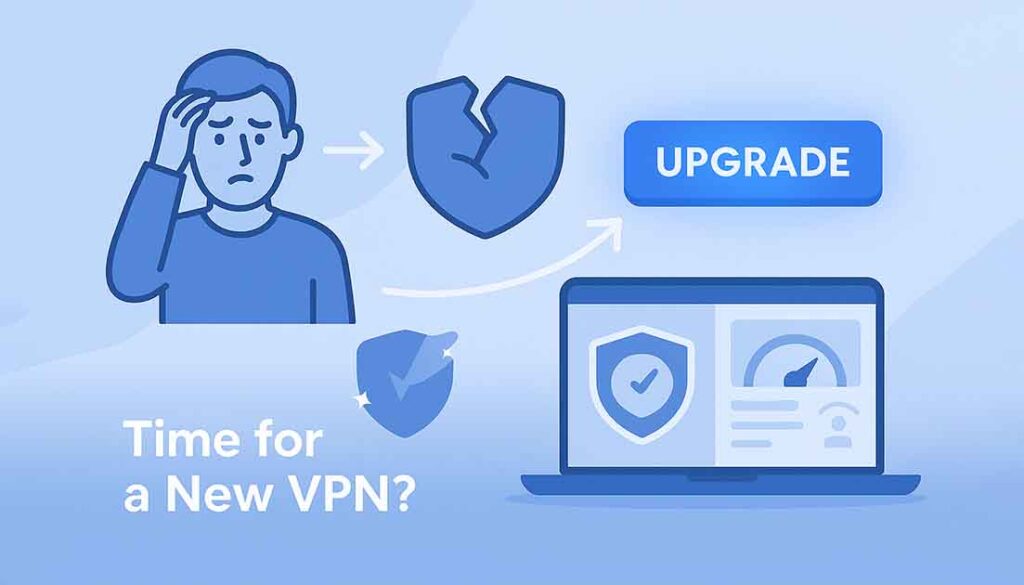
Sometimes, the problem isn’t your settings or network, it’s the VPN itself. If you’ve tried all the speed optimization tips and are still dealing with slow, laggy performance, it might be time to move on.
Here’s how to know when to upgrade or switch:
🚨 Signs It’s Time to Switch VPNs
- Your speeds are consistently poor across all servers and protocols
- Customer support is unhelpful or unresponsive
- You’re experiencing frequent disconnections or DNS leaks
- Streaming platforms block your current VPN completely
- You’re paying a premium but still get basic performance
✅ Pro Tip: Before switching, try the same VPN on another device or network. If it’s still slow, it’s time to explore better-rated providers optimized for speed and streaming.
FAQs
How can I increase my VPN speed?
You can improve VPNs speed by switching to a closer server, using a faster protocol like WireGuard, closing background apps, and connecting through Ethernet instead of Wi-Fi. Updating your VPN app and changing DNS settings can also help.
Why is my VPN connection so slow?
VPNs add a layer of encryption and routing, which can slow things down, especially if the server is far, overloaded, or using a slower protocol. Local network issues or ISP throttling can also be to blame.
Which VPN protocol is the fastest?
WireGuard is currently the fastest mainstream protocol. It’s lightweight, secure, and optimized for both speed and low latency. IKEv2 is also fast, especially on mobile devices.
Does using a VPN slow down your internet?
Yes, slightly. VPNs introduce encryption and reroute your traffic, which adds overhead. However, with the right provider and setup, the impact can be minimal and in some cases, VPNs may bypass ISP throttling and improve speed.
Is free VPN slower than paid one?
Usually, yes. Free VPNs often have limited bandwidth, overcrowded servers, and slower infrastructure. Paid services invest in faster networks and offer better speed-boosting features.
Can a better VPN fix slow speeds?
Yes. A high-performance VPNs can drastically improve your connection speed, especially if your current one lacks optimized servers, fast protocols, or efficient routing.
What’s the best VPN for speed?
VPNs like NordVPN, Surfshark, and ExpressVPN consistently rank among the fastest thanks to high-performance protocols like WireGuard, large server networks, and streaming-optimized servers.
Should I use a wired connection with a VPN?
Absolutely. Ethernet is typically faster and more stable than Wi-Fi, especially when tunneling traffic. It’s ideal for gaming, streaming, or heavy downloads.
Final Verdict
If your VPN feels sluggish, don’t give up on it just yet. Most speed issues are fixable and often just require small adjustments to your settings, server location, or device setup.
From switching to faster protocols like WireGuard to choosing the right server and clearing background clutter, you have multiple ways to boost your Virtual Private Network performance without sacrificing privacy.
But if you’ve tried everything and the slowdown persists, it might be time to switch to a VPN built for speed.
Ready to Upgrade to a Faster VPN?
Don’t waste time with laggy connections. See our top picks for high-speed, streaming-ready VPNs that just work — right out of the box.
Explore Top VPNs
